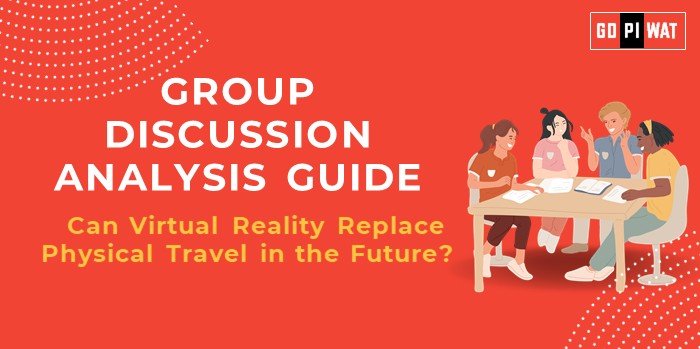📋 Group Discussion (GD) Analysis Guide: Can Virtual Reality Replace Physical Travel in the Future?
🌐 Introduction to Virtual Reality and Physical Travel
- Opening Context: Virtual Reality (VR) technology is rapidly transforming how people experience the world, from immersive gaming to virtual tourism. Its potential to replace physical travel is becoming a significant debate in light of technological advancements and environmental concerns.
- Topic Background: VR offers an alternative to physical travel by simulating real-world experiences. With ongoing innovation, such as haptic feedback and hyper-realistic visuals, VR could revolutionize industries like tourism, education, and professional collaboration.
📊 Quick Facts and Key Statistics
- 📈 Global VR Market Size: $30.7 billion in 2023, projected to grow at a 15.2% CAGR by 2030.
- 🌍 Carbon Emissions from Air Travel: Air travel contributes approximately 2.5% of global CO2 emissions, positioning VR as an eco-friendly alternative.
- 💻 Virtual Tourism Growth: The VR tourism market is expected to reach $18 billion by 2026.
- 🎓 User Engagement: 74% of people believe VR can enhance educational and travel experiences.
👥 Stakeholders and Their Roles
- 💻 Technology Companies: Innovating VR hardware and software for immersive experiences.
- 🏖️ Travel and Tourism Industry: Exploring VR as a tool for marketing and alternative experiences.
- 🌱 Environmental Advocates: Promoting VR as a sustainable option to reduce carbon footprints.
- 🙋♀️ Consumers: Adopting VR as a cost-effective and accessible alternative to travel.
🏆 Achievements and Challenges
✨ Achievements
- Immersive Virtual Tourism: Platforms like Google Earth VR enable users to explore global landmarks virtually.
- Cost-Effective Solutions: VR allows users to experience distant locations without travel expenses.
- Accessibility: VR brings global experiences to people unable to travel due to physical, financial, or situational constraints.
⚠️ Challenges
- Limited Sensory Experience: VR cannot replicate the tactile, olfactory, and cultural immersion of physical travel.
- Technological Barriers: High costs and equipment limitations make VR inaccessible to many.
- Psychological Impact: Over-reliance on virtual experiences may lead to social isolation.
🌍 Global Comparisons
- 🇰🇷 South Korea: VR cafés provide virtual tourism experiences to locals.
- 🇯🇵 Japan: VR is used for virtual cultural festivals and museum tours.
📖 Case Studies
- 🏛️ The Louvre, Paris: Offers virtual tours of its iconic art collections.
- ⛰️ Mount Everest VR: Enables users to experience climbing the mountain without the physical risks.
📚 Structured Arguments for Discussion
- 💪 Supporting Stance: “VR can transform tourism by providing affordable, sustainable, and immersive alternatives to physical travel.”
- ❌ Opposing Stance: “VR cannot replicate the cultural, sensory, and emotional depth of real-world travel.”
- ⚖️ Balanced Perspective: “While VR complements travel with immersive previews or alternatives, it cannot fully replace the tangible benefits of physical experiences.”
💡 Effective Discussion Approaches
- 📊 Opening Approaches:
- “The VR tourism market is set to reach $18 billion by 2026, indicating a shift in how we explore the world.”
- “Can VR ever truly replace the sensory richness of visiting a new culture in person?”
- 🎯 Counter-Argument Handling:
- Limited Sensory Experience: “Technological advancements in haptic feedback and scent simulators may narrow this gap.”
- Cultural Immersion: “While VR cannot replace firsthand cultural interaction, it provides a starting point for education and awareness.”
🔍 Strategic Analysis of Strengths and Weaknesses
- ✅ Strengths: Eco-friendly alternative, accessibility, innovative experience.
- ❌ Weaknesses: Limited sensory interaction, high costs, potential social isolation.
- 🚀 Opportunities: Integration with AI, expanding tourism accessibility, and reducing carbon emissions.
- ⚠️ Threats: Competition with physical tourism, technological obsolescence, consumer reluctance.
🎓 Connecting with B-School Applications
- 📌 Real-World Applications: Links to sustainable business strategies, technological innovation, and market analysis in tourism.
- ❓ Sample Interview Questions:
- “How can VR tourism help address environmental concerns in the travel industry?”
- “What business models can make VR more accessible to developing markets?”
- 📘 Insights for B-School Students: VR exemplifies innovation management and highlights the intersection of technology and sustainability.


